译林英语必修3Unit3 Back to the past Project (共20张PPT)
文档属性
| 名称 | 译林英语必修3Unit3 Back to the past Project (共20张PPT) |  | |
| 格式 | zip | ||
| 文件大小 | 1.2MB | ||
| 资源类型 | 教案 | ||
| 版本资源 | 牛津译林版 | ||
| 科目 | 英语 | ||
| 更新时间 | 2020-03-29 13:26:21 | ||
图片预览

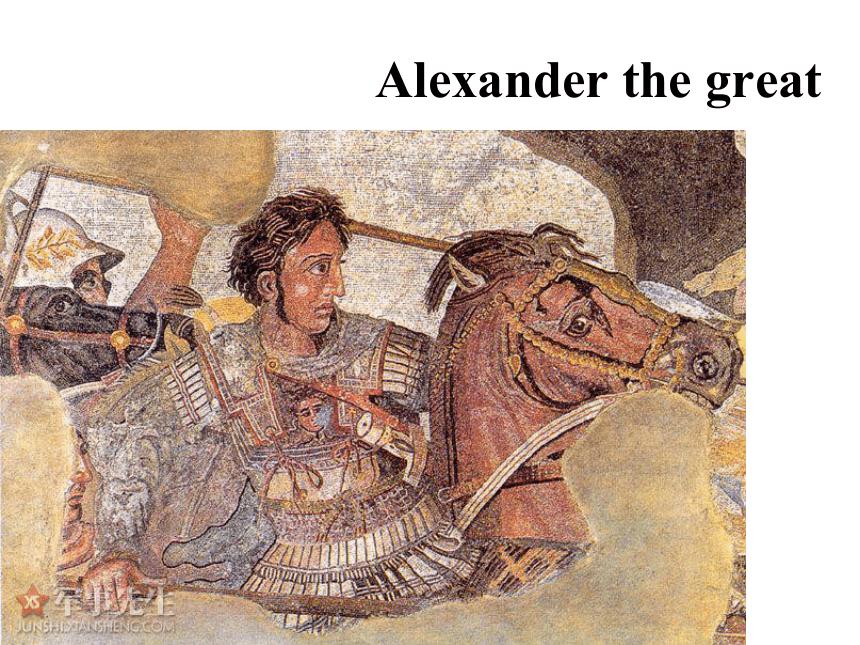
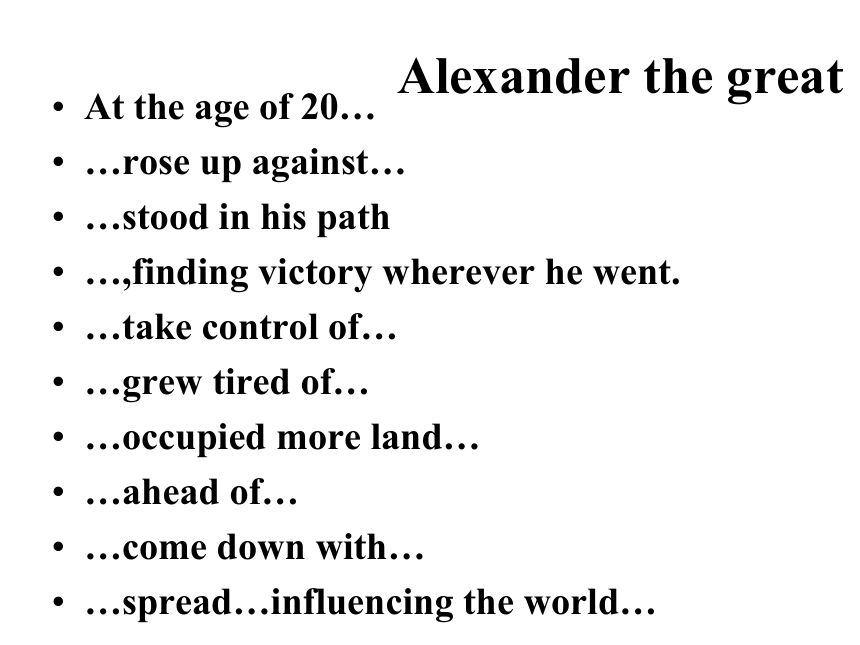
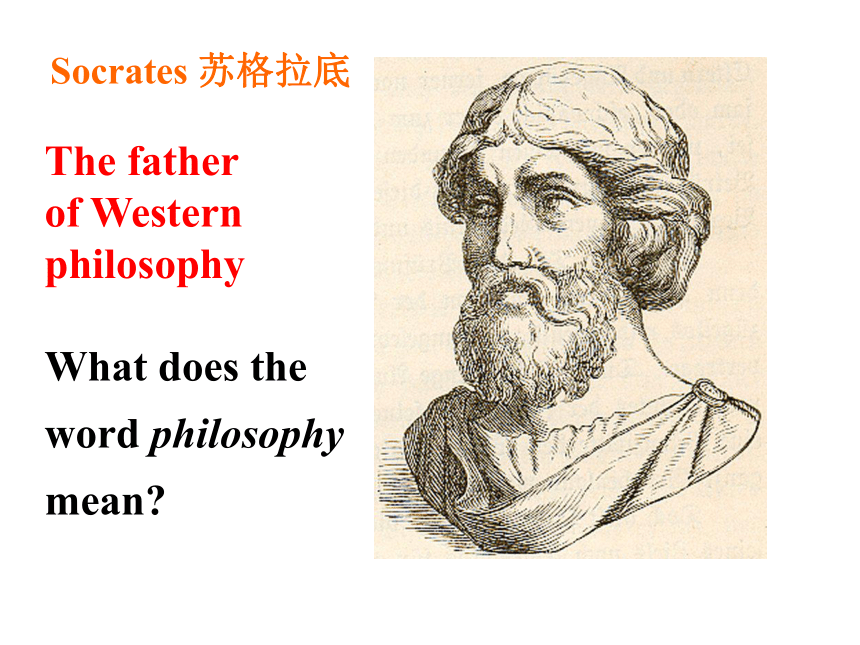
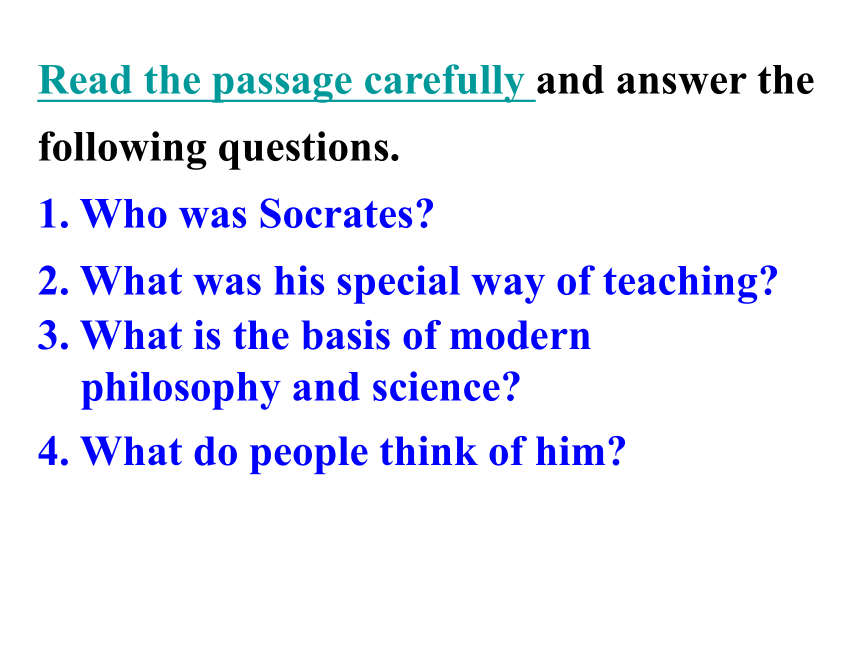
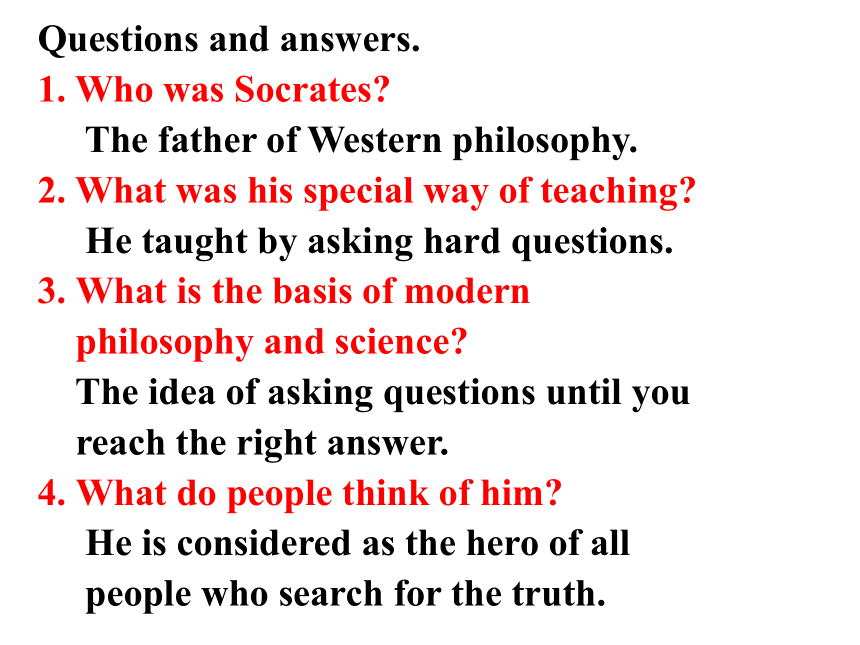
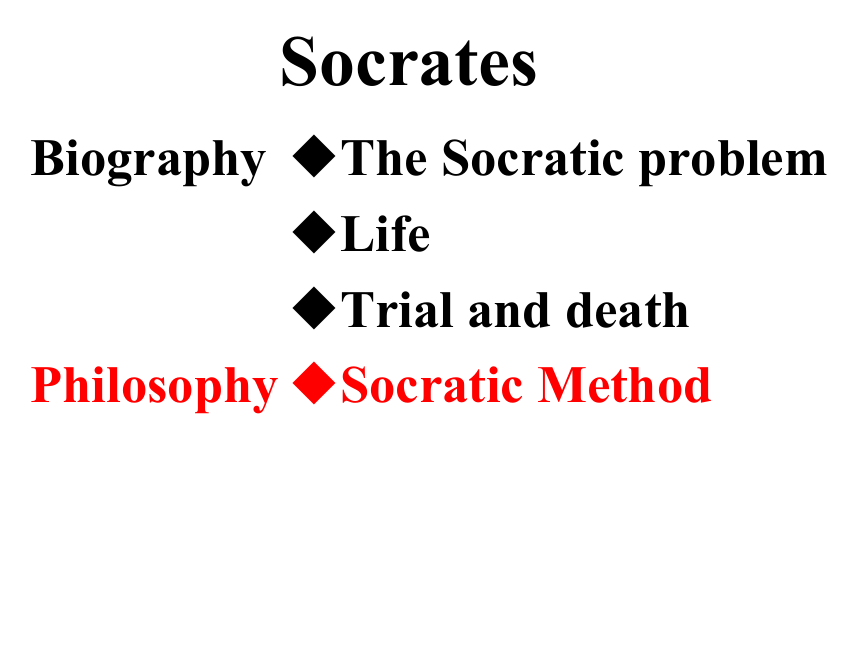
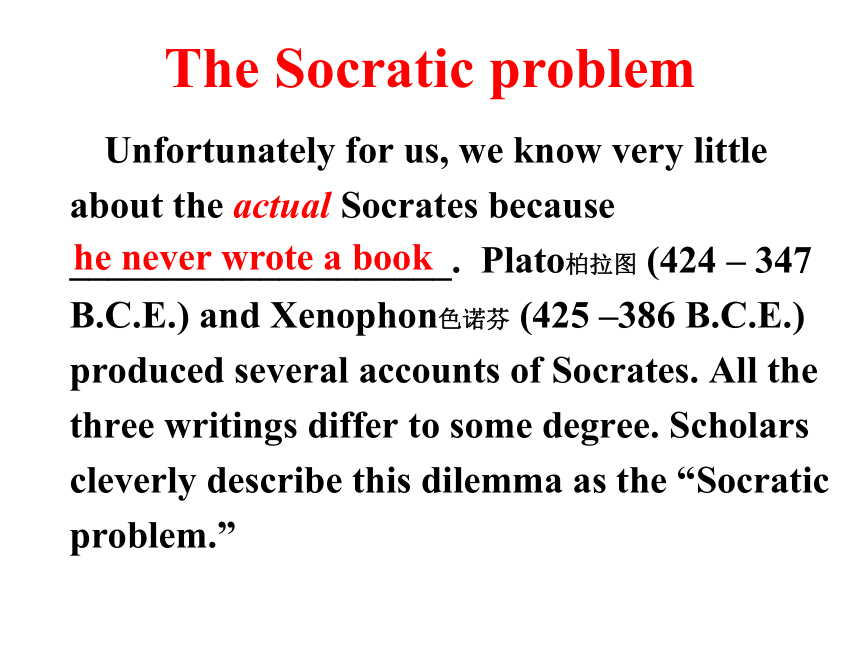

文档简介
(共20张PPT)
Making a poster about a historical figure
Alexander the great
Alexander the great
At the age of 20…
…rose up against…
…stood in his path
…,finding victory wherever he went.
…take control of…
…grew tired of…
…occupied more land…
…ahead of…
…come down with…
…spread…influencing the world…
Socrates 苏格拉底
The father of Western philosophy
What does the word philosophy mean?
Read the passage carefully and answer the following questions.
1. Who was Socrates?
2. What was his special way of teaching?
3. What is the basis of modern
philosophy and science?
4. What do people think of him?
Questions and answers.
1. Who was Socrates?
The father of Western philosophy.
2. What was his special way of teaching?
He taught by asking hard questions.
3. What is the basis of modern
philosophy and science?
The idea of asking questions until you
reach the right answer.
4. What do people think of him?
He is considered as the hero of all
people who search for the truth.
Socrates
Biography
Philosophy
The Socratic problem
Life
Trial and death
Socratic Method
The Socratic problem
Unfortunately for us, we know very little about the actual Socrates because ____________________. Plato柏拉图 (424 – 347 B.C.E.) and Xenophon色诺芬 (425 –386 B.C.E.) produced several accounts of Socrates. All the three writings differ to some degree. Scholars cleverly describe this dilemma as the “Socratic problem.”
he never wrote a book
His life
The father of Western philosophy was ________.
He was born in _______, Greece in 469 BC.
As a young man, he was a brave ________ .
Later, he became a ________, but he taught for free and earned his salary from being a common _______.
We know very little about him __________ this.
Athens
Socrates
soldier
aside from
teacher
worker
His trial and death
What questions did Socrates always ask?
What did people do after they had had enough of him?
Why was he taken to court?
How did he defend himself at his trial?
Did his defence work?
How was he put to death?
His teaching
Socrates taught by _______________. He __________ his students to develop and explain their own __________. In many cases, his questions made his students __________ their own errors. Many students got _____________ while others changed their opinions. His way of ___________ the truth is called the ______________.
challenged
asking questions
arguments
approaching
aware of
embarrassed
Socratic Method
His influence
Socrates has had a deep influence on
______________________.
The idea of _____________________________
__________________ is the basis of modern philosophy and science.
asking questions until you reach the right answer
Western thought and science
I know one thing, that I know nothing.
What is love?
One day, Plato asked Socrates what love is.
Socrates said: " I ask you to go across this field, pick up and bring back the biggest and best ear of wheat, but remember one thing, you cannot go back, and you just have one chance. " Then Plato did so, but he came back with nothing after a long time.
Socrates asked him why?
Plato answered: " I once saw some very big and good wheat when I walked through the field, but I was always thinking that maybe there would some bigger and better ones, so I just passed by; but what I saw later is not better than before, so I had nothing at last."
Socrates said this is love.
One day, an acquaintance met Socrates and said, "Do you know what I just heard about your friend?"
一天,苏格拉底遇到一位熟人,熟人问:“你知道我刚刚听说你朋友发生什么事情了吗?”
"Hold on a minute," Socrates replied. "Before you talk to me about my friend, it might be a good idea to take a moment and filter what you're going to say. That's why I call it the triple-filter test. The first filter is Truth. Have you made absolutely sure that what you are about to tell me is true?"
“等等,”苏格拉底答道。“在你说出我朋友的事之前,何不稍等片刻,让我对你想说的内容进行过滤。我把它叫做‘三重筛选测试’。第一重滤网是‘真相’。你能百分之百确定你的消息是真事吗?”
"Well, no," the man said, "actually I just heard about it and..."
“呃,不能,”那人说,“其实我也是刚听人说的……”
"All right," said Socrates. "So you don't really know if it's true or not. Now, let's try the second filter, the filter of Goodness. Is what you are about to tell me about my friend something good?"
“好的,”苏格拉底说。“所以你并不清楚事情的真伪。现在,我们来进行第二次筛选——‘善意’。你要告诉我的是有关我朋友的好事吗?”
"No, on the contrary..."
“不,恰恰相反……”
"So," Socrates continued, "you want to tell me something bad about my friend, but you're not certain it's true. You may still pass the test though, because there's one filter left—the filter of Usefulness. Is what you want to tell me about my friend going to be useful to me?"
“那么,”苏格拉底接着说,“你打算告诉我一件关于我朋友的坏事,但你又不确定其真伪。不过你依然有可能通过测试,因为还有一重滤网——‘实用’。这件关于我朋友的事对我有用吗?”
"No, not really."
“不,没什么用。”
"Well," concluded Socrates, "if what you want to tell me is neither true, nor good, nor even useful, why tell it to me at all?"
“好吧,”苏格拉底总结道,“如果你要告诉我的事情既不是真的,又不是好事,甚至毫无用处,那你又何必告诉我呢?
Confucius
(551 – 479 BC)
Do not do to others what you do not want done to yourself.
Chinese politician, teacher, editor, and social philosopher of the Spring and Autumn Period of Chinese history
Useful expressions
除了······以外
知之甚少
对······有深刻影响
在许多情况下
知道
受够了
希腊诸神的存在
使情况更糟
被处死
寻求真理
aside from
know very little about
have a deep influence on
in many cases
be aware of
have enough of
the existence of the Greek gods
make a bad situation worse
be put to death
search for the truth
Homework
Making a poster about a historical figure
Alexander the great
Alexander the great
At the age of 20…
…rose up against…
…stood in his path
…,finding victory wherever he went.
…take control of…
…grew tired of…
…occupied more land…
…ahead of…
…come down with…
…spread…influencing the world…
Socrates 苏格拉底
The father of Western philosophy
What does the word philosophy mean?
Read the passage carefully and answer the following questions.
1. Who was Socrates?
2. What was his special way of teaching?
3. What is the basis of modern
philosophy and science?
4. What do people think of him?
Questions and answers.
1. Who was Socrates?
The father of Western philosophy.
2. What was his special way of teaching?
He taught by asking hard questions.
3. What is the basis of modern
philosophy and science?
The idea of asking questions until you
reach the right answer.
4. What do people think of him?
He is considered as the hero of all
people who search for the truth.
Socrates
Biography
Philosophy
The Socratic problem
Life
Trial and death
Socratic Method
The Socratic problem
Unfortunately for us, we know very little about the actual Socrates because ____________________. Plato柏拉图 (424 – 347 B.C.E.) and Xenophon色诺芬 (425 –386 B.C.E.) produced several accounts of Socrates. All the three writings differ to some degree. Scholars cleverly describe this dilemma as the “Socratic problem.”
he never wrote a book
His life
The father of Western philosophy was ________.
He was born in _______, Greece in 469 BC.
As a young man, he was a brave ________ .
Later, he became a ________, but he taught for free and earned his salary from being a common _______.
We know very little about him __________ this.
Athens
Socrates
soldier
aside from
teacher
worker
His trial and death
What questions did Socrates always ask?
What did people do after they had had enough of him?
Why was he taken to court?
How did he defend himself at his trial?
Did his defence work?
How was he put to death?
His teaching
Socrates taught by _______________. He __________ his students to develop and explain their own __________. In many cases, his questions made his students __________ their own errors. Many students got _____________ while others changed their opinions. His way of ___________ the truth is called the ______________.
challenged
asking questions
arguments
approaching
aware of
embarrassed
Socratic Method
His influence
Socrates has had a deep influence on
______________________.
The idea of _____________________________
__________________ is the basis of modern philosophy and science.
asking questions until you reach the right answer
Western thought and science
I know one thing, that I know nothing.
What is love?
One day, Plato asked Socrates what love is.
Socrates said: " I ask you to go across this field, pick up and bring back the biggest and best ear of wheat, but remember one thing, you cannot go back, and you just have one chance. " Then Plato did so, but he came back with nothing after a long time.
Socrates asked him why?
Plato answered: " I once saw some very big and good wheat when I walked through the field, but I was always thinking that maybe there would some bigger and better ones, so I just passed by; but what I saw later is not better than before, so I had nothing at last."
Socrates said this is love.
One day, an acquaintance met Socrates and said, "Do you know what I just heard about your friend?"
一天,苏格拉底遇到一位熟人,熟人问:“你知道我刚刚听说你朋友发生什么事情了吗?”
"Hold on a minute," Socrates replied. "Before you talk to me about my friend, it might be a good idea to take a moment and filter what you're going to say. That's why I call it the triple-filter test. The first filter is Truth. Have you made absolutely sure that what you are about to tell me is true?"
“等等,”苏格拉底答道。“在你说出我朋友的事之前,何不稍等片刻,让我对你想说的内容进行过滤。我把它叫做‘三重筛选测试’。第一重滤网是‘真相’。你能百分之百确定你的消息是真事吗?”
"Well, no," the man said, "actually I just heard about it and..."
“呃,不能,”那人说,“其实我也是刚听人说的……”
"All right," said Socrates. "So you don't really know if it's true or not. Now, let's try the second filter, the filter of Goodness. Is what you are about to tell me about my friend something good?"
“好的,”苏格拉底说。“所以你并不清楚事情的真伪。现在,我们来进行第二次筛选——‘善意’。你要告诉我的是有关我朋友的好事吗?”
"No, on the contrary..."
“不,恰恰相反……”
"So," Socrates continued, "you want to tell me something bad about my friend, but you're not certain it's true. You may still pass the test though, because there's one filter left—the filter of Usefulness. Is what you want to tell me about my friend going to be useful to me?"
“那么,”苏格拉底接着说,“你打算告诉我一件关于我朋友的坏事,但你又不确定其真伪。不过你依然有可能通过测试,因为还有一重滤网——‘实用’。这件关于我朋友的事对我有用吗?”
"No, not really."
“不,没什么用。”
"Well," concluded Socrates, "if what you want to tell me is neither true, nor good, nor even useful, why tell it to me at all?"
“好吧,”苏格拉底总结道,“如果你要告诉我的事情既不是真的,又不是好事,甚至毫无用处,那你又何必告诉我呢?
Confucius
(551 – 479 BC)
Do not do to others what you do not want done to yourself.
Chinese politician, teacher, editor, and social philosopher of the Spring and Autumn Period of Chinese history
Useful expressions
除了······以外
知之甚少
对······有深刻影响
在许多情况下
知道
受够了
希腊诸神的存在
使情况更糟
被处死
寻求真理
aside from
know very little about
have a deep influence on
in many cases
be aware of
have enough of
the existence of the Greek gods
make a bad situation worse
be put to death
search for the truth
Homework
